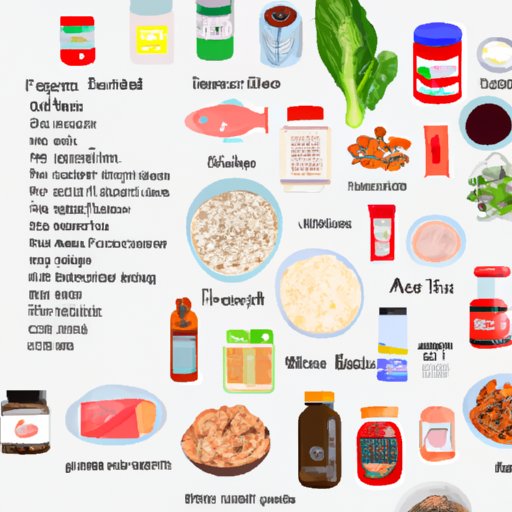Introduction
When it comes to eating for digestive health, a bland diet is often helpful. This type of diet is designed to avoid irritating the gastrointestinal tract and reduce symptoms like nausea, vomiting, stomach pain, and diarrhea. A bland diet consists of low-fiber, low-fat, easy-to-digest foods that are free of spices, strong flavors, and rough textures.
Definition of Bland Diet
A bland diet is a type of meal plan that includes foods that are generally soft, low in fiber, and not spicy or acidic. The purpose of a bland diet is to avoid irritating the digestive system, which can be especially helpful for those who have issues like ulcers, gastritis, heartburn, irritable bowel syndrome (IBS), Crohn’s disease, and other digestive disorders.

Benefits of a Bland Diet
The main benefit of a bland diet is that it can help reduce symptoms of digestive distress, such as nausea, vomiting, stomach pain, and diarrhea. According to research published in the journal Nutrients, following a bland diet can also help improve nutrient absorption, reduce inflammation in the gut, and promote overall digestive health.

Planning and Preparing Bland Meals
When planning meals for a bland diet, it’s important to focus on foods that are soft, low in fiber, and easy to digest. Here are some tips for planning and preparing meals that fit a bland diet.
Meal Planning Tips
When planning your meals, it’s important to include a variety of healthy, nutrient-rich foods. Aim to include lean proteins, low-fat dairy, fruits, vegetables, and whole grains in your meal plan. It’s also important to stay hydrated and drink plenty of fluids throughout the day.
Recommended Foods
Foods that are generally considered safe on a bland diet include cooked vegetables (without the skin), bananas, applesauce, white bread, white rice, boiled potatoes, plain pasta, eggs, fish, and poultry. Dairy products like milk, yogurt, and cheese are also allowed. When it comes to beverages, stick to water, herbal tea, and clear soda.
Sample Menu Ideas
Here are some sample menu ideas for a bland diet:
- Breakfast: Cooked oatmeal with banana slices and cinnamon, plus a cup of herbal tea
- Lunch: Baked chicken, mashed potatoes, and steamed carrots
- Snack: Applesauce and cottage cheese
- Dinner: Baked salmon, white rice, and steamed broccoli

Making Bland Foods Taste Better
One downside of a bland diet is that food can become boring and bland over time. To make bland foods taste better, try adding seasonings and herbs, sauces and condiments, and healthy fats.
Seasonings and Herbs
Adding herbs and spices to food can help add flavor and make meals more interesting. Some seasonings that can be used on a bland diet include garlic powder, onion powder, black pepper, oregano, basil, parsley, thyme, and rosemary.
Sauces and Condiments
Low-fat sauces and condiments like ketchup, mustard, barbecue sauce, and salsa can also help add flavor to bland foods. Be sure to read labels and choose options that are low in sugar and sodium.
Healthy Fats
Adding healthy fats to meals can help increase satiety and add flavor. Good sources of healthy fats include olive oil, avocado, nuts, and seeds.
Eating Out on a Bland Diet
Eating out on a bland diet can be tricky, but it’s possible to find meals that fit your dietary needs. Here are some tips for finding appropriate restaurants and suggested dishes.
Finding Appropriate Restaurants
When looking for a restaurant, try to find one that offers a variety of options. Ask the waiter or waitress if they can suggest any dishes that are low in fat, low in fiber, and free of spices. You can also call ahead and ask the chef to prepare a special meal that fits your dietary needs.
Suggested Dishes
When eating out, look for dishes that contain lean proteins, cooked vegetables, and cooked grains. Examples of appropriate dishes include grilled chicken, steamed vegetables, baked potatoes, fish tacos, and bean burritos.
Supplements for a Bland Diet
Adding supplements to a bland diet can help ensure you’re getting all the nutrients you need. Here are some types of supplements that may be beneficial.
Types of Supplements
Some supplements that may be helpful on a bland diet include probiotics, omega-3 fatty acids, fiber supplements, multivitamins, and digestive enzymes. Talk to your doctor before starting any new supplement.
Benefits of Adding Supplements
Adding supplements to a bland diet can help provide essential nutrients that may be missing from your meals. Probiotics, for example, can help balance the bacteria in your gut, while omega-3 fatty acids can help reduce inflammation. Fiber supplements can help keep your digestive system regular, and multivitamins can help fill any nutrient gaps.
Conclusion
A bland diet can be beneficial for those experiencing digestive issues. This type of diet consists of low-fiber, low-fat, easy-to-digest foods that are free of spices, strong flavors, and rough textures. Eating a variety of healthy, nutrient-rich foods and adding supplements can help ensure you’re getting all the nutrients you need. With a little creativity, meals on a bland diet can be flavorful and enjoyable.
Summary of Benefits
Following a bland diet can help reduce symptoms of digestive distress, improve nutrient absorption, reduce inflammation in the gut, and promote overall digestive health. Additionally, adding supplements to a bland diet can help provide essential nutrients that may be missing from your meals.
Final Thoughts
If you’re experiencing digestive issues, talk to your doctor about whether a bland diet might be right for you. With a little planning and creativity, meals on a bland diet can be flavorful and enjoyable.
(Note: Is this article not meeting your expectations? Do you have knowledge or insights to share? Unlock new opportunities and expand your reach by joining our authors team. Click Registration to join us and share your expertise with our readers.)
